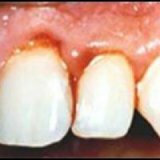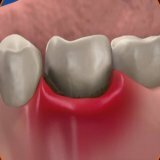Glossalgia
 Glossalgia is a neurostomatological pathology, manifested by the appearance in a healthy person of painful sensations in the projection of the tongue and not manifested by morphological changes on the part of the tongue. When the glossalgia extends to the surrounding oral structure of the mouth, the term "stomalgia" should be used. The primary genesis of glossalgia is not proven, therefore, there is every reason to assume that this pathology always develops against the background of the underlying disease.
Glossalgia is a neurostomatological pathology, manifested by the appearance in a healthy person of painful sensations in the projection of the tongue and not manifested by morphological changes on the part of the tongue. When the glossalgia extends to the surrounding oral structure of the mouth, the term "stomalgia" should be used. The primary genesis of glossalgia is not proven, therefore, there is every reason to assume that this pathology always develops against the background of the underlying disease.
The prevalence of glossalgia in the overall structure of morbidity in the oral cavity is at least 30%.Since glossalgia significantly worsens the quality of life of a patient suffering from this pathology, the problem of glossalgia should be considered not only medical, but also social.
Causes of glossalgia
The primary source in considering such a disease as "glossalgia" should be considered the scientific works of Weiss and Buisson, published in 1838, after which the attention of doctors attracted the changes occurring in the human body in this pathology.
Disease "glossalgia" refers to the category of polytheological diseases, in the emergence of which can not be identified as the leading cause, and most often, this pathology develops with a combination of etiological factors. The risk group for the development of glossalgia is made up of older women, while this pathology does not affect almost any men.
The debut of the clinical manifestations of glossalgia most often occurs during the period of post-traumatic exposure to the oral mucosa, which causes circulatory disturbances at the level of the capillaries and the development of concomitant stagnation of blood in the mucous membranes. As a traumatic effect can enter into the mouth of a foreign object, incorrectly sealed tooth canals and installed prostheses, as well as the very operative manual for tooth extraction.
The development of glossalgia may be affected by unsatisfactory state of the organs of the gastrointestinal tract, the circulatory and endocrine systems. Thus, in 75% of cases of glossalgia, the patient has a concomitant decrease in the secretory function of the stomach, and in 70% of these changes are accompanied by the development of chronic colitis.
Recent scientific studies devoted to the study of the etiology of a pathology such as the glossalgia of the language ended with the conclusion that the pathological change in the hypothalamus plays the main role in the development of the disease. The indirect effect of the hypothalamus in this situation is a violation of the function of the structures of the autonomic nervous system that regulates all metabolic processes in the body, as well as the work of endocrine glands. The negative impact of psychoemotional stress on the development of glossalgia is also not excluded.
For the development of glossalgia, a favorable background disease is considered to be any organic pathology of the central nervous system, as well as ischemic brain damage that occurs when a stroke occurs. In this situation, the patient develops a deterioration in sensitivity and a distortion of perception in response to the stimulus in the form of the appearance of paresthesia and pain syndrome.
In almost 100% of cases of bulbar syndrome, manifested by the defeat of the wandering, glossopharyngeal nerves, development of glossalgia is observed. With this pathology, the patient develops false sensations in the projection of the language against the background of the complete absence of an external stimulus.
The peak incidence of glossalgia in women falls on the climacteric period, during which the female body undergoes some changes in the thyroid gland, vegetative centers and the vasomotor system. Due to a kind of "vegetative-endocrine storm" occurring during menopause, the sensory excitability of the trigeminal nerve nuclei is significantly reduced. Anemias of iron deficiency are often accompanied by the development of glossalgia.
In some situations, with a severe allergic reaction in humans, glossalgia may occur, which is most often observed when using a toothpaste containing cinnamaldehyde, as well as using chewing gum. This type of glossalgia does not need a medical correction and is self-leveling after eliminating the allergen.
Symptoms and signs of glossalgia
Glossalgia of the tongue is manifested in patients by burning, tingling and sagging the surface of the tongue, and these symptoms can be either short-term or permanent. Many patients in describing the symptoms of glossalgia compare their feelings with the burning of the tongue when taking acute food.
More than half of patients with glossalgia note excessive dry mouth, which is aggravated after excessive psychoemotional activity. In a situation where the disease "glossalgia" is of a short-term nature, patients always note a clear dependence of the onset of symptoms and a nervous experience. A remarkable fact is that the manifestations of glossalgia decrease in intensity or may completely disappear after eating, which in 70% is the cause of the development of alimentary obesity and bulimia.
If we consider the localization of pain with glossalgia, then the maximum severity of the pain syndrome is observed in the lateral areas, as well as at the tip of the tongue, while the root of the tongue is completely absent. The pathognomonic symptom of glossalgia is the constant variability of the localization of pain.
In some situations, the disease "glossalgia" in a patient can regress itself, but in most cases this pathology is recurrent.
When objective examination of a patient suffering from glossalgia, there are no morphological changes from the mucous membrane of the tongue, although in some situations there may be a slight hypertrophy of the papillae and the presence of white plaque. In elderly people who are at risk for this pathology, an objective examination often reveals varicose veins of the tongue.
Pathognomonic signs of glossalgia is a decrease in the threshold of pain sensitivity in the affected area, as well as dystrophy of the salivary glands, accompanied by hypo-salivation.
Paresthesia and pain syndrome are in most cases symmetrical and clearly localized. Some patients with glossalgia complain about severity in the language, especially with prolonged conversation, which causes the development of dysarthria.
With prolonged course of glossalgia, patients develop psychoemotional disorders in the form of a tendency to depression, anxiety and suspiciousness. The difficulty of treating patients with glossalgia lies in the fact that most of these people suffer from psychoneurotic diseases and fear of iatrogenia.
Due to the fact that the manifestations of glossalgia are largely similar to the symptoms of other diseases of the oral cavity, the conduct of a qualitative differential diagnosis of the patient's clinical signs must precede the appointment of a therapy regimen.
Similar to glossalgia, the symptomatology has a so-called pathological bite, or other organic diseases of the tongue. The principal difference between glossalgia in this situation is the complete absence of morphological changes in the mucous membrane of the mouth and tongue.
Treatment of glossalgia
With the complete absence of treatment measures, the disease "glossalgia" acquires a protracted nature of the course and can last for many years. Self-disappearance of signs of glossalgia is an exception rather than the rules, in connection with which, the use of drug therapy for this disease is mandatory.
The primary goal of the therapeutic profile in case of glossalgia is the complete sanitation of the oral cavity, not excluding prosthetics. To stop the pain syndrome with glossalgia, use local anesthetics in the form of Novocain, Lidocaine, an alcohol solution of propolis.
The basis of pathogenetic treatment of glossalgia should first of all be the therapeutic measures of the etiologic orientation, that is, eliminating the root cause of the development of this pathological condition. A mandatory component of therapy with glossalgia is a qualitative psychocorrection, since most often the development of this pathology is accompanied by psychoemotional disorders, aggravating the course of glossalgia. As measures for psychocorrection, the use of various techniques( hypnosis, suggestion, reflexotherapy) is permissible.
The primary task of the dentist, with the patient's glossology, is to eliminate the traumatic effect on the surface of the tongue, for which use is made to replace substandard seals, grinding sharp edges of teeth.
In a situation where glossalgia is only a manifestation of any chronic pathology that exists in the patient, the etiological treatment consists in carrying out therapy for the underlying disease, after which the manifestations of glossalgia can be independently leveled.
Drug treatment with glossalgia is used to normalize homeostatic processes, eliminate psychoneurological disorders, as well as relief of severe pain syndrome, if it is noted in the patient.
In order to normalize the psychoemotional sphere to a patient with glossalgia, it is advisable to assign a small tranquilizer( Adaptol orally at a daily dose of 500 mg).The course of vitamin therapy lasting 10 days with the use of injection forms of B vitamins also has a good effect in eliminating the manifestations of glossalgia.
With the patient's severe pain syndrome with glossalgia, the use of the blockade of the lingual nerve is shown by the method of administering trimecaine preparations. Beneficial effect on the process of curing glossalgia is the use of keratoplastic preparations such as Rose hips, which prevent the spread of the pathological process in the oral cavity.
In order to eliminate the excessive dryness of the oral mucosa, it is pathogenetically justified to prescribe drugs that enhance salivation.
In the form of methods of physiotherapy in glossalgia, galvanotherapy, electrosleep, ionophoresis are most often used.
The duration of therapy with glossalgia depends on the individual capabilities of the patient's body and on average is at least two months.
The majority of patients, long suffering from glossalgia, note the beneficial effect of the combined treatment of this pathology, which includes not only the use of medications, but also the use of prescriptions for unconventional treatment, in which the most often are herbal decoctions and vegetable oils.
A good soothing effect is possessed by decoction of herb lover, for the preparation of which it is necessary 2 tablespoons. Chopped grass, pour cold water in the amount of two glasses and boil for 15 minutes, then still insist for 15 minutes. This decoction is used as a mouth rinse solution. In addition, as a solution for rinsing the mouth, you can use a decoction of the bark of oak, with dissolved in it natural honey.
For internal reception with glossalgia, the use of freshly squeezed fruit and vegetable juices with the addition of olive oil or fish oil is recommended.
Glossalgia - which doctor will help ?If there is or suspected the development of glossalgia, you should immediately seek advice from such doctors as a dentist, a psychotherapist.



